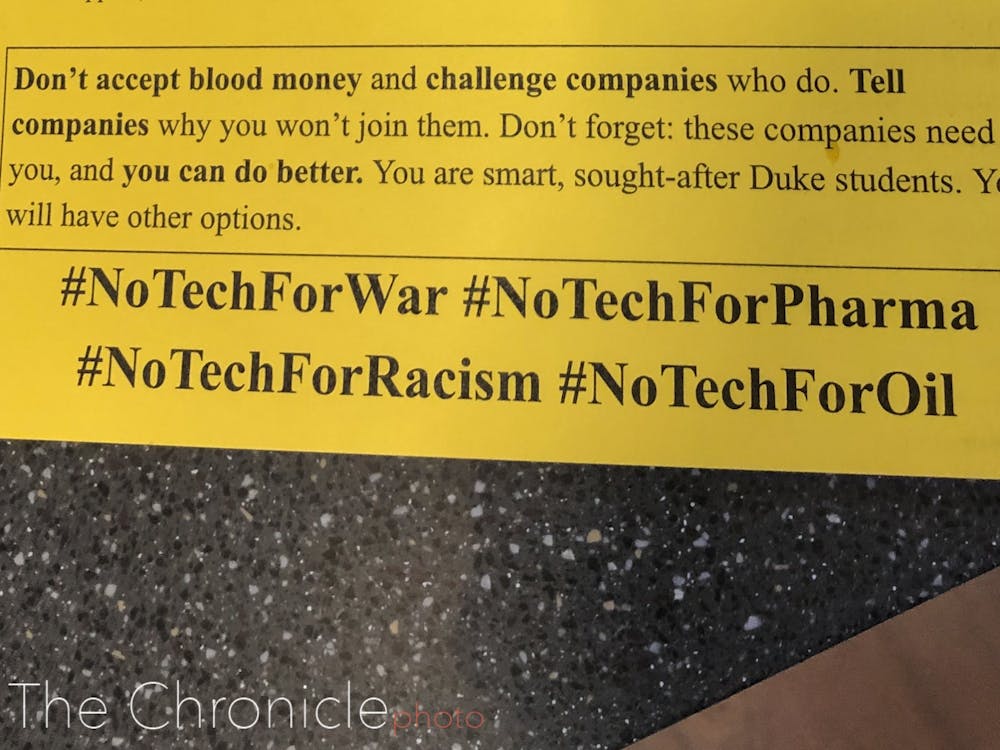Palantir may be missing, but student protesters returned.
Last semester, students protested against Palantir for its contract with the U.S. Immigration and Customs Enforcement. Protesters opposed the company’s presence during an ethics workshop held Sept. 23 and at the Sept. 24 TechConnect, an annual networking event for engineering and computer science students.
Although Palantir did not recruit at Wednesday’s TechConnect, students singled out a handful of other recruits for alleged unethical practices and handed out flyers during the event advising people to avoid those companies.
“You have an opportunity to fight against the opioid crisis, surveillance technologies, imperialism, medical racism and the climate crisis,” the flyer read.
The flyer warned students about multiple major companies, including Amazon, Microsoft and GlaxoSmithKline.
“Don’t accept blood money and challenge companies who do,” the flyer read. “Tell companies why you won’t join them. Don’t forget: these companies need you, and you can do better. You are smart, sought-after Duke students. You will have other options.”
For the majority of the event, a few protesters stood outside Penn Pavilion with signs reading “No Tech 4 War” and “Don’t Take Blood Money,” while others went inside to distribute flyers to students at the event. A security officer stood on guard during the event.
At around 2:45 p.m., a group of students started chanting, “No Tech for ICE, Amazon think twice.” Almost immediately after, the officer told the protesters to leave the building.
Michael Schoenfeld, vice president for public affairs and government relations, wrote in an email to The Chronicle that the students protesting outside Penn Pavilion were observing university demonstration guidelines.
“It was only when they attempted to enter the building to pass out flyers at the event, which is not permitted, that they were asked to leave and immediately complied without further incident,” he wrote.
Protesters who spoke with The Chronicle conveyed that they wanted students to hold companies accountable and think critically about where they worked, and they wanted Duke administration to reconsider who can come recruit on campus.
Schoenfeld affirmed the University’s stance that students should “be able to make their own choices about their careers” and that TechConnect provides an opportunity for students to explore their wide range of options. At the same time, he wrote that Duke is committed to protecting “the ability of students to express their beliefs and positions in accordance with our policies.”
The flyer’s allegations and company responses
Among the companies noted on the flyers distributed by protesters were Amazon, cited as “[providing] ICE and DHS with database and profiling services used to track immigrants,” and Microsoft, which they mentioned “supports ICE with Azure Government Cloud Software and GitHub subsidiary.” Similar flyers without mentions of Amazon and Microsoft were found in Perkins Library.
Some other companies noted on the flyers were GlaxoSmithKline, which the flyer stated “committed the biggest healthcare fraud to-date (paid $3 billion fine),” NetApp, referred to as selling “surveillance systems to the Syrian government,” and Optum, cited as developing “racist algorithms used by United Health Group” ranking “chronically-ill Black patients the same as healthy white patients.”
In response to the student protesters’ allegations, Tyler Mason, vice president of communications at Optum, wrote in an email to The Chronicle that these claims are based on a recent study that “mischaracterizes” an Optum cost prediction algorithm as racially biased.
“The algorithm is not racially biased,” he wrote. “It is designed to predict future costs that individual patients may incur based on past health care experiences, and does not result in racial bias when used for that purpose, a fact with which the study authors agreed.”
He wrote that the study only covers a single health system that “incorrectly” used the algorithm as the sole factor for determining who should receive care.
When used as designed and intended, he wrote that the tool actually enables “effective and equitable care management programs, helping clinicians provide appropriate care to all patients.”
On a similar note, a GSK spokesperson responded to the incident in an email to The Chronicle, writing that the company believes the protesters may have been referencing “decades-old and long-settled allegations.”
“We are committed to patient safety and responsibility,” she wrote. “We are world leaders in global public health. In fact, for decades, we have worked to improve health globally and reduce the impact of diseases that disproportionately affect the poorest people in the world, such as polio, malaria, and HIV.”
Microsoft declined to comment. Amazon and NetApp did not respond in time for comment.
Get The Chronicle straight to your inbox
Signup for our weekly newsletter. Cancel at any time.

Mona Tong is a Trinity senior and director of diversity, equity and inclusion analytics for The Chronicle's 117th volume. She was previously news editor for Volume 116.

